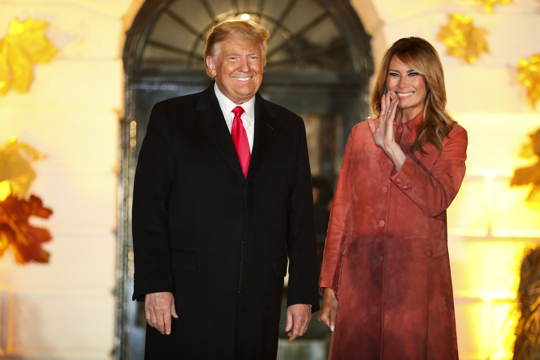US President Trump on Wednesday granted clemency to more than 100 people in one of his final acts as commander-in-chief, including his former Chief Strategist Stephen Bannon.
Trump announced a wave of pardons and commutations shortly after midnight on Wednesday. Bannon, rapper Lil Wayne, GOP fundraiser Elliot Broidy and former Detroit Mayor Kwame Kilpatrick were among the notable figures to receive clemency, along with dozens of lower profile individuals whose cases were raised by criminal justice reform advocates, The Hill reported.
Trump granted clemency to 143 individuals in total, just hours before leaving office: 73 received pardons, while 70 were granted commutations.
The Bannon pardon was perhaps the most surprising of the batch, given the former Breitbart News editor had a high-profile falling out with the Trump family after denigrating Donald Trump Jr. in Michael Wolff's 2018 book, "Fire and Fury".
"Mr. Bannon has been an important leader in the conservative movement and is known for his political acumen," press secretary Kayleigh McEnany said in announcing Bannon's pardon.
Bannon was a top adviser on Trump's 2016 campaign and served as the Chief White House Strategist for roughly seven months. He was arrested and charged last August with defrauding hundreds of thousands of donors who contributed to a fundraising campaign for a private border wall.
The President reportedly went back and forth over whether to grant clemency to Bannon before deciding to do so.
Trump, who had branded Bannon as "sloppy Steve" upon the release of Wolff's book, distanced himself from his former adviser upon news of the charges.
"I don't like that project. I thought it was being done for showboating reasons," Trump said at the time. "It was something that I very much felt was inappropriate to be doing."
Trump also pardoned Broidy, a former top Republican National Committee (RNC) fundraiser, who was charged last year with conspiring to act as an unregistered foreign agent as part of a back channel effort to lobby the Justice Department.
Kilpatrick, the former Democratic mayor of Detroit, was convicted in 2008 of perjury and obstruction of justice.
And Lil Wayne faces prison time after pleading guilty to federal gun charges. The rapper, whose birth name is Dwayne Michael Carter Jr., met with Trump on the campaign trail in a meeting the campaign later touted as it courted Black voters.
Trump also commuted the sentence of Bill Kapri, better known as the rapper Kodak Black, who sentenced to 46 months in prison for making a false statement on a federal document. He had served less than half of his sentence.
The President issued pardons to several individuals who were charged with non-violent drug offenses, including Tena Logan, MaryAnne Locke and Caroline Yeats and. Alice Johnson, who Trump pardoned and who became a face of the White House's criminal justice reform efforts, advocated for several of the individuals granted clemency on Wednesday.
Johnson was among those who advocated for clemency for Kilpatrick as well.
Trump has come under scrutiny for favoring political allies and well connected individuals in doling out pardons and commutations. Past recipients of clemency include ex-Trump campaign chairman Paul Manafort, longtime Trump associate Roger Stone and ex-Trump national security adviser Michael Flynn.
Following his election loss, Trump issued two sizable patches of pardons last month, including those for ex-Republican lawmakers Chris Collins and Duncan Hunter; his former campaign chairman Paul Manafort; longtime friend and adviser Roger Stone; and Charles Kushner, his son-in-law Jared Kushner's father. He also pardoned Michael Flynn, his onetime national security adviser who pleaded guilty to lying to the FBI in connection with special counsel Robert Mueller's investigation.
There had been much speculation leading up to Tuesday's announcement about who Trump would ultimately choose to grant clemency in his waning hours as President. Some Republicans had pushed for Trump to pardon WikiLeaks founder Julian Assange or former National Security Agency official Edward Snowden, but neither was given clemency.
Presidents typically issue a flurry of pardons or commutations in their final day in office. There was speculation in recent weeks that Trump would move to preemptively pardon himself or his adult children to shield them from federal charges after leaving office. Trump opted against doing so, though he still faces a Senate impeachment trial in the coming weeks and the prospect of state investigations.
Trump is slated to leave Washington DC on Wednesday morning foregoing the usual practice of attending the incoming President's inauguration. Trump will be sent off with a ceremony at Joint Base Andrews outside the district. Meanwhile, Joe Biden will be sworn in as the 46th President of the US around noon during a pared-down ceremony at the US Capitol.
(IANS)




















